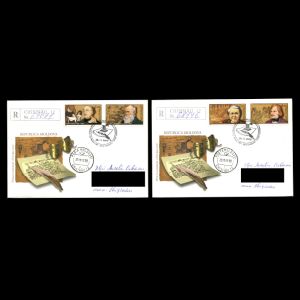Moldova 2009 "Personalities"
| << previous page | back to index | next page >> |
| Issue Date | 26.11. 2009 |
| ID | Michel: 678-681; Scott: 649a-d; Stanley Gibbons: 672-675; Yvert et Tellier: 592-595; Category: Dw |
| Design | Vitalie Rosca |
| Stamps in set | 4 |
| Value |
1,20 L. - Eugenij Ionescu (1909-1994) 1,20 L. - Efrosiniya Kersnovskaya (1907-1995) 4,50 L. - Nikolai Gogol (1809-1852) 7,00 L. - Charles Robert Darwin (1809-1882). |
| Emission/Type | commemorative |
| Issue place | Chisinau |
| Size (width x height) | 46 mm x 27.50 mm |
| Layout | 4 MS of 10 stamp each (2x5) |
| Products | FDC x2, MS x4 |
| Paper | Chalky |
| Perforation | 14 x 14.5 |
| Print Technique | Offset |
| Printed by | Enterprise d'Etat editorial-polygraphique Tipografia Centrala Chisinau Moldova |
| Quantity | 100.000, 100.000, 50.000, 50.000 |
| Issuing Authority | Ministere du developpement de l'information, Republique de Moldova |

On November 26th, 2009, the Post Authority of Moldova issued set of 4 stamps "Personalities" that shows some local and word wide famous persons, who had anniversaries in 2009:
- 100th anniversaries of Eugenij Ionescu
- 102th anniversaries of Efrosiniya Kersnovskaya
- 200th anniversaries of Nikolai Gogol
- 200th anniversaries of Charles Robert Darwin
Charles Robert Darwin (1809-1882), was an English naturalist, geologist, and biologist, widely known for his contributions to evolutionary biology.

|
| Charles Robert Darwin on stamp of Moldova 2009, MiNr.: 681, Scott: 649d. |
He published his theory with compelling evidence for evolution in his 1859 book "On the Origin of Species by Means of Natural Selection, or the Preservation of Favoured Races in the Struggle for Life", overcoming scientific rejection of earlier concepts of transmutation of species.
By the 1870s the scientific community and much of the general public accepted evolution as a fact.
However, many favoured competing explanations and it was not until the emergence of the modern evolutionary synthesis from the 1930s to the 1950s that a broad consensus developed that natural selection was the basic mechanism of evolution.
In modified form, Darwin's scientific discovery is the unifying theory of the life sciences, explaining the diversity of life.
In recognition of Darwin's pre-eminence, he was one of only five 19th century UK non-royal personages to be honoured by a state funeral, and was buried in Westminster Abbey, close to John Herschel and Isaac Newton. Darwin's work had far-reaching impacts on the development of Paleontology, Antropology and many other Biology related sciences.
Products and associated philatelic items
| FDC (clean and circulated) | Mini-Sheets | |
 |
 |
 |
| The reverse side is here | ||
References

|
Acknowledgements
Many thanks to Dr. Peter Voice from Department of Geological and Environmental Sciences, Western Michigan University, for reviewing the draft page and his valuable comments.| << previous page | back to index | next page >> |


